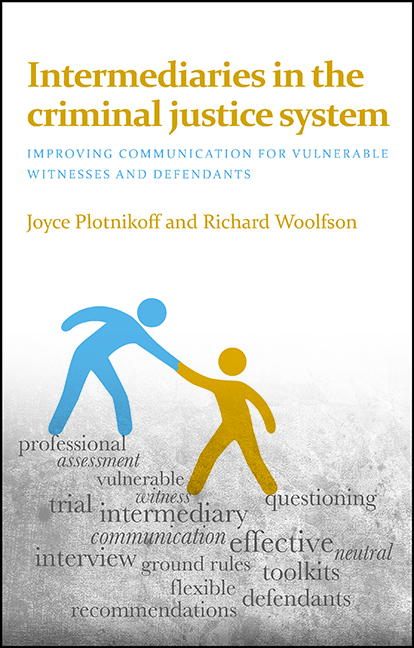 Intermediaries in the Criminal Justice System
Intermediaries in the Criminal Justice System Book contents
- Frontmatter
- Contents
- About the authors
- The Nuffield Foundation
- Acknowledgements
- Foreword
- one Introduction: a fresh pair of eyes
- two The intermediary scheme in England and Wales
- three Behind the scenes: planning to assess the witness
- four Assessment methods and involvement of the interviewer
- five Communication aids and stress reduction strategies
- six Contributing to the effectiveness of the police interview
- seven Negotiating professional space at the ground rules hearing
- eight Making the ground rules hearing effective
- nine ‘Every reasonable step’: preparation for giving evidence
- ten Cross-examination: research, case law, training and regulation
- eleven Cross-examination: intervention at trial
- twelve Cross-examination: challenges at the cutting edge
- thirteen The uneasy position of vulnerable defendants
- fourteen A new profession
- fifteen Conclusion
- References
- Index
- Table of cases
- Legislation
- Rules
- Practice directions
eight - Making the ground rules hearing effective
Published online by Cambridge University Press: 08 March 2022
- Frontmatter
- Contents
- About the authors
- The Nuffield Foundation
- Acknowledgements
- Foreword
- one Introduction: a fresh pair of eyes
- two The intermediary scheme in England and Wales
- three Behind the scenes: planning to assess the witness
- four Assessment methods and involvement of the interviewer
- five Communication aids and stress reduction strategies
- six Contributing to the effectiveness of the police interview
- seven Negotiating professional space at the ground rules hearing
- eight Making the ground rules hearing effective
- nine ‘Every reasonable step’: preparation for giving evidence
- ten Cross-examination: research, case law, training and regulation
- eleven Cross-examination: intervention at trial
- twelve Cross-examination: challenges at the cutting edge
- thirteen The uneasy position of vulnerable defendants
- fourteen A new profession
- fifteen Conclusion
- References
- Index
- Table of cases
- Legislation
- Rules
- Practice directions
Summary
Ground rules hearings are now a requirement in intermediary cases. They must also be held where ‘directions for appropriate treatment and questioning’ are necessary, even if the case does not involve an intermediary (Criminal Procedure Rule 3.9(7), 2015; Criminal Practice Directions 3E.2, 3E.3, 2015; toolkit 1 and checklist, Ground rules hearings and the treatment of vulnerable people in court, www.theadvocatesgateway.org). The Court of Appeal expects ground rules to be discussed in every vulnerable witness case, except in ‘very exceptional circumstances’ (R v Lubemba, R v JP [2014] EWCA Crim 2064, para 42). The hearing gives intermediaries an opportunity to explain that their role is to assist everyone to communicate with the witness. Agreed ground rules minimise the risk of inappropriate questioning at trial and reduce the need for interventions by the intermediary or judge. There are benefits of making clear from the start ‘where the boundaries of questioning lie’ (Leveson, 2015, para 257). In practice, however, ground rules hearings are often squeezed into the court’s timetable just before the witness’s evidence begins, while the jury is waiting, leaving little time for meaningful discussion.
Criminal Procedure Rule 3.9(7), (2015) sets out an agenda for the hearing. This includes directions about the duration of questioning (discussed in this chapter); the use of communication aids (Chapter Five); what questions ‘may or may not be asked’ and the manner of questioning; (Chapters Ten and Eleven); and ‘relieving a party of any duty to put that party’s case to a witness or defendant in its entirety’ (Chapter Twelve). The Court of Appeal suggests additional issues for discussion (R v Lubemba, R v JP [2014] EWCA Crim 2064, para 43) including the frequency of breaks (this chapter); general care of the witness, refreshing the witness’s memory and introductions (addressed in Chapter Nine); and asking the lawyers to write out questions in advance (Chapter Twelve).
This chapter describes the characteristics of effective ground rules hearings and reasons for scheduling the hearing before the day of the witness’s evidence. The Bench should give clear directions about the intermediary’s ability to intervene orally, the rules to be followed at trial and its intention to take action if the rules are breached. If ground rules are not observed, or something else goes wrong during questioning, a further ground rules discussion mid-trial is likely to be helpful.
- Type
- Chapter
- Information
- Intermediaries in the Criminal Justice SystemImproving Communication for Vulnerable Witnesses and Defendants, pp. 109 - 128Publisher: Bristol University PressPrint publication year: 2015


